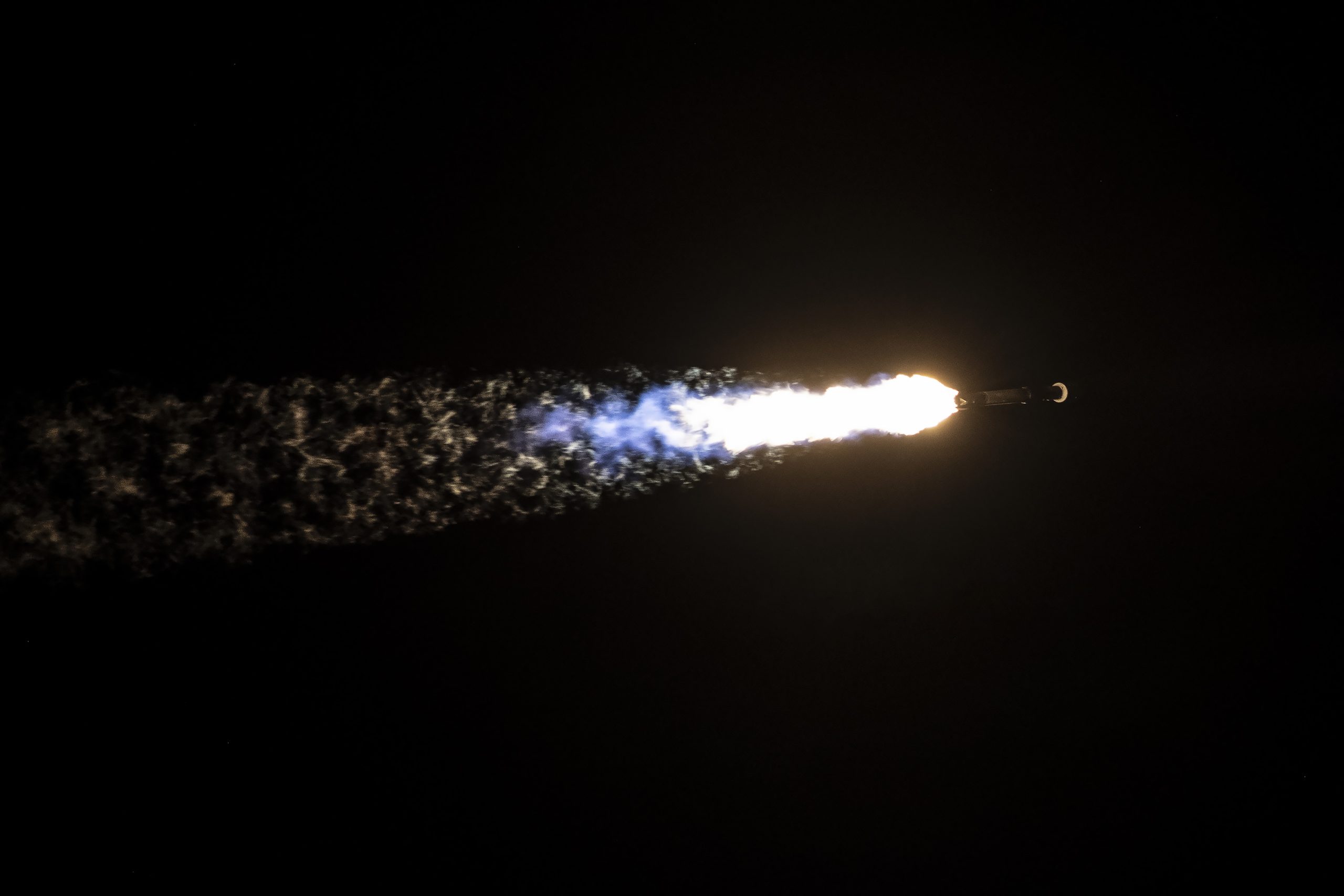SpaceX’s Starlink satellite internet constellation has lost more than two hundred satellites in low Earth orbit (LEO) since July, according to data from a satellite tracking website. This is the first time that Starlink has lost a significant number of satellites in a short time period, and these losses are typically influenced by solar flares that cause changes in orbit and damage or destroy the spacecraft. The nature of the satellites, i.e. their model, is unclear, and if they are the newer Starlink satellites that SpaceX regularly launches, then the firm will have to conduct at least nine Falcon 9 launches to make up for the satellites lost.
Since it is a SpaceX subsidiary, Starlink has rapidly built the world’s largest LEO satellite internet constellation and the world’s largest satellite constellation by rapidly launching them through the Falcon 9 rocket. However, upgrades to the spacecraft and constraints with the Falcon 9 have reduced the number of satellites that the firm can launch, with its latest launches seeing roughly 22 satellites per launch for a nearly one-third reduction over the 60 satellites that SpaceX launched during the early days of the Starlink buildout.
The newer satellites are second-generation spacecraft that SpaceX received the launch authorization from the FCC less than a year back. They are more powerful and are thus larger and heavier than the earlier satellites, which limits the Falcon 9 ability to squeeze large numbers inside a single payload fairing.
Satellites in orbit or space have to face off against various hazards that can damage or put them out of commission. SpaceX faced one such event in February 2022, when a solar flare damaged at least 40 of the recently launched satellites. SpaceX confirmed this and shared that the heat from the solar flare increased atmospheric density and made it impossible for the satellites to maintain their trajectory.
I srsly dont want the internet infra to be controlled by the dick headed person.
You just don’t know about the other dickheads in charge.
Luckily he’s not the majority stakeholder.
I’m not touching it even with a 2ft pole. I don’t want every website to be throttled except Twitter.
This is a complete non story. They have a design life of only a few years. They have already been replaced in orbit with upgraded ones.
Total clickbait.
“This is a non story”
Billionaires adding to space junk that will keep us from getting the fuck off this rock is a non story, eh? Tell me more.
Sure! I’d be happy to.
The satellites operate in an extremely low orbit. At the end of their life they are manually de-orbited. If they fail, they will naturally de-orbit themselves in just a few years. They contribute to “space junk” in no way.
The precise position of all the Starlink satellites is known, and space is much bigger than you appear to be imagining, so the network will in no way impede lauching rockets.
There is no need to simply make stuff up about Starlink. There are plenty of reasons to hate Elon without inventing things.
What part of “reentry into earths atmosphere” did you have trouble comprehending?
I’d be way more worried about the amount of CO2 being released with so many Falcon 9 launches.
Okay, so is this actual news, or just reporting on the fact that starlink satellites have a 5 year lifespan by design? Because this reads like the numerous other articles out there that are ignoring the fact that satellites need fuel to stay in low earth orbit, and that fuel eventually runs out.
I dislike musk as much as the next guy, but let’s not pretend this is something it isn’t.
I get your point, but I suspect there’s more here than just lifespan. I don’t think we know the reason but the article says this:
As a comparison, only 248 satellites had burned up at the start of this year, so the number destroyed during the last two months is higher than the figure for the first seven months of the year.
If 200 over the span of 2 months is “normal” then I have questions about the financial viability of the project.
It kinda depends on what we are considering a starlink satellite. They did launch a batch of satellites that experienced some issues, and some of them did come down. Iirc those were new models that were going up for the first time.
That said, I wouldn’t be too concerned about it. Firstly because we are talking about less than a percentage point of the total, and second because once the bugs are ironed out, a different company that isn’t run by a moron will likely step in to do a better job.
Firstly because we are talking about less than a percentage point of the total
(200 / 5000) * 100 = 4%
Ah, fair enough. Not sure why I thought there were more in total. In fact I think there may be less than 5k.
By the way, what happens to these satellites once they reach their planned lifespan and run out of fuel?
There is sufficient drag in Low Earth Orbit for the crafts to deorbit without station keeping, meaning they burn up in the atmosphere within a few months/years depending on atmospheric conditions.
Thank you for the explanation!
Yeah, if you want to avoid that, you need to go way up into more expensive and less effective orbits
“And this is how we trapped ourselves in our own planet”
Well at least it’s a habitable planet, right?
Has been, until end of last year. Now? Not so much.
The way politics are moving rn I can imagine the big funny happening soon, which could trigger a new ice age though.
“it’s”, yes.
“it’s” is a contraction of it and is…
Or it and was
It’s ok, we were already trapped in our planet. There is no planet B…unless you don’t mind living in high-tech caves :) on Earth they’re called “vaults”.
Im fine with it, so long as we all get extra water chips we should be good.
Do they deorbit? Or did musk just pollute our orbit for no reason whatsoever?
They deorbit very quickly.
That’s good. Happy to hear that.
And then… just… drop somewhere?
No, they vaporize on reentry.
Ah ok lol, that makes more sense
I’m no expert by any means but it seems incredibly wasteful that we build satellites, then expel tons of CO2 into the atmosphere to get them into orbit, only for them to just burn up after a few years.
We can’t even reclaim the material because it literally burns and disintegrates as it’s falling out of orbit.
Seriously what the fuck are we doing???
Burning things creatively.
Every time I read anything about starlink, it all just seems so quintessentially American.
You’ve got effective monopolies of communication infrastructure, which causes everyone to be underserved, and instead of just fixing the monopoly problem, you fire off infinite rockets full of cell towers that burn up in a year
So billionaires filling Earth 's orbit with junk …
luckily LEO junk will be pulled into Earth’s atmosphere without propulsion
This place hates Elon Musk so goddamn much they suddenly become experts on satellites. I bet Musk has very little to do with the day to day at Starlink.
One can hate Musk and Starlinks separately.
They ruin our night sky and make Kessler syndrome worse and worse.
These are also mostly irrelevant to Kessler syndrome. At such low orbits, any debris is cleaned out in months or only a couple years
The number of satellites in orbit right now should have next to 0 impact on your view of the night sky. This can be proven with some pretty simple equations. Should we get rid of GPS satellites too?
what is this supposed to prove. Go outside at night and look, they’re not clogging up the sky. At the very worst they’re a faint little line you can barely see. I think that is worth giving internet to unserved areas of the world.
This is the first time that Starlink has lost a significant number of satellites in a short time period
It’s an Elon debacle, it’s probably been a problem from day one that he’s happily shoveled other people’s money at instead of fixing it or admitting he’s a moron.
Musk is a minority stakeholder in Starlink. This place hates Musk so much that they’ll criticize and actual innovative company serving the underserved.
Like the Ukraine? Piss off with your billionaire worship.
People all over the world use starlink internet that would be functionally locked out of it other wise. In no way is pointing that out billionaire worship. Use your head
Big Brainy in chief probaly thought the could cut down on latency if they move the orbits closer to the atmosphere and no one cares enough to correct him.
This just sounds like regular LEO attrition, these satellites are small and “simple” so they were never going to last long (not trying to defend musk here, starlink is full of issues)
Probably. It would be funny, though :)
deleted by creator
Sounds like a lot of space debris :(
One of the benefits of such a low orbit - they deorbit quickly












